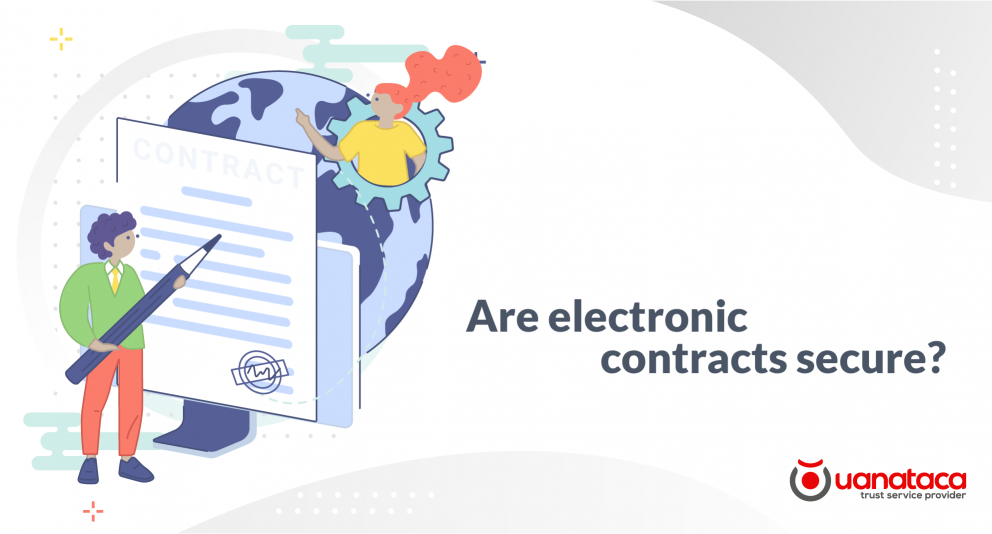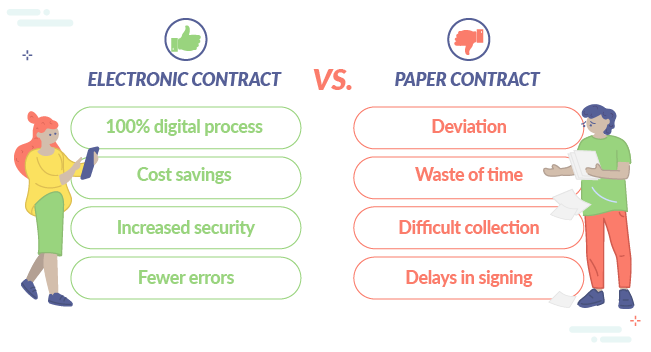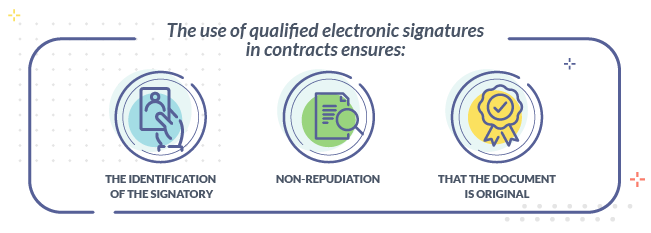
In an increasingly digital world, remote transactions have been gaining ground over face-to-face contracting. Nowadays, 1 out of every 2 contracts that are signed is electronic, which means that if you have a business, it is very likely that electronic contracts are already part of your day-to-day business.
In this context we will discuss the advantages of electronic contracts and how you can make the most of them thanks to One-Shot Signature with Video ID: the qualified electronic signature solution with Video ID.
What is an electronic contract?
The electronic contract is established as ''any contract in which the offer and acceptance are transmitted by means of electronic data processing and storage equipment connected to a telecommunications network'', which means that both the offer and the acceptance are made by telematic means.
Very simply, we can say that an electronic contract is a contract that is made or concluded by electronic means, i.e. no simultaneous physical presence is required.
Electronic contract VS paper contract
Irrespective of its format, a contract is defined as an agreement of wills that creates or conveys rights and obligations to the parties who enter into it. However, there are significant differences between a paper-based contract and an electronic contract:

✔️Pros of electronic contracts
- 100% digital processes: electronic contracts can be signed electronically at any time and in any place. This advantage undoubtedly favours instant contract closure and thus increases the conversion rate.
- Cost savings: printing, physical archiving and travel costs are eliminated. In addition, its paperless format is more sustainable and benefits brand perception.
- More secure: paper documents can be altered after signing. On the other hand, contracts signed with a qualified or advanced electronic signature, as it is linked to the data signed by the signature, it is possible to detect any subsequent modification.
- Fewer errors and greater agility: the electronic contract allows the parties to see the terms of the contract and to detect any errors before signing. Even if the contract needs to be amended and the signature re-signed, this can be done instantly, without delay and without unnecessary travel.
❌Cons of paper-based contracts
- Loss or destruction: when the parties are not in the same place, the contract moves from one place to another. During this process, different factors can jeopardise the integrity of the document, such as misplacement. Even at the time of archiving, paper contracts are also exposed to accidents that can destroy them, such as fires or floods.
- Waste of time: the physical management of contracts requires a lot of time and resources that do not pay off. Freeing up this expense allows it to be invested in more productive tasks for the business.
- Difficult collection: another disadvantage of the paper contract is that it is not always possible to obtain the signature of all parties at the right time or within the deadlines set.
- Delays in signing: The paper-based signing process can take days, even weeks. If sending and signing is not done immediately, there is a very high risk of losing customers.
Types of electronic contracts
Electronic contracts continue to be traditional contracts with the speciality that they are concluded by telematic means, which is why certain requirements regarding form, deadlines, subjects or obligations, among others, apply to them. They can be classified according to different criteria:
1.- According to the parties involved: Electronic commercial or consumer contract
- If at least one consumer is involved in the contract, it is an electronic consumer contract, known as a Business to Consumer (B2C) contract. For example, the granting of a consumer credit.
- On the other hand, if the agreement is between entrepreneurs, we will be dealing with an electronic commercial contract or Business to Business (B2B), such as when a software or business application is contracted.
2.- According to the object of the contract: Electronic contract of delivery or of performance
- The electronic delivery contract is one that refers to the sale of a product. It can be physical, such as a printed book, or digital, for example an e-book.
- The electronic performance contract refers to the provision of a service which, again, may also be physical, such as a car wash, or digital, such as the use of an electronic signature service.
3.- According to the form of the manifestation of the will: pure or mixed electronic contract
- In the pure electronic contract, the signatories' manifestations of will are made entirely electronically. For example, acceptance of the privacy policy or contracting via a website.
- A mixed electronic contract is considered to be one in which, in order to express the decision to contract, traditional means are involved, such as a form that must be printed, filled in and sent.
4.- According to the mode of performance: direct or indirect electronic contracts
- In the direct electronic contract modality, both the contract and the receipt of the purchased good or service are provided electronically.
- On the other hand, when a contract is formalised by telematic means but delivered in physical presence, we are dealing with an indirect electronic contract. An example could be the purchase of an item of clothing on a website and its collection in a physical shop.
Legal validity of electronic contracts
Electronic contracts are legally binding. Thanks to the Electronic Signatures in the Global and International Commerce Act (ESIGN Act) and the Uniform Electronic Transactions Act (UETA) are just as enforceable as traditional pen-and-paper contracts.
Contracts concluded by electronic means will produce all the effects provided for by the legal system, when the consent and the other requirements necessary for their validity are present.

Therefore, if there is consent on both sides, the contract can be concluded online. Thus, the key to legal certainty for all parties is to prove that consent actually exists. To prove this, the electronic signature is used, a tool that proves the signatory's acceptance or approval. However, as we will clarify below, not all types of electronic signatures have the same evidentiary quality, nor do all providers offer the same guarantees.
Qualified electronic signature: maximum probative force for electronic contracts
The COVID-19 crisis and the change in consumer habits from physical to digital have accelerated the use of different solutions for signing electronic contracts. However, not all tools offer the same guarantees. The more security measures they incorporate, the less danger there is of identity theft and repudiation of the signature.
This is exactly what happened in the case ruled by the Provincial Court of Lleida, where the defendant was absolved of the payment of a loan formalised with a signature that did not have sufficient probative force. And although this does not mean that, a priori, the signature used was not valid, they ruled that a sufficiently guaranteeing system was not used as it did not have a recognised certificate and did not comply with the requirements of the current regulations.
This ruling shows that not all the technologies available for signing contracts offer the same level of confidence. Very secure and reliable tools coexist on the market with others that are much less solid and robust. Therefore, when choosing the appropriate solution, it must be borne in mind that the evidentiary strength will depend on the type of electronic signature, the process designed by each provider and the accompanying evidence.

Of all the types of signature defined by eIDAS, the qualified signature is the only one that is on a par with the handwritten signature, standing alone as full proof and even reversing the burden of proof in the event that it is challenged. That is, it has the maximum probative force in a trial.
In the area of employment contracts, the use of a qualified electronic signature is particularly advisable. This guarantees the authorship, identity and authenticity of the consent given.
As mentioned above, the particular guarantees of the provider are also a key factor in the decision making process. Uanataca, Qualified Trust Service Provider according to eIDAS (Regulation No. 910/2014 of the European Parliament and of the Council of 23 July 2014), issues its clients with qualified electronic signature services official opinions for their presentation in court, an added value aimed at strengthening the evidentiary activity of the clients.
⭐️Our recommendation: One-Shot Signature with Video ID ⭐️
Uanataca has designed the first solution on the market that enables qualified digital onboarding: One-Shot Signature with Video ID.
Thanks to this solution, digital onboarding and the subscription of electronic contracts will be possible with the certification of the digital identity of customers online and with qualified electronic signature.
